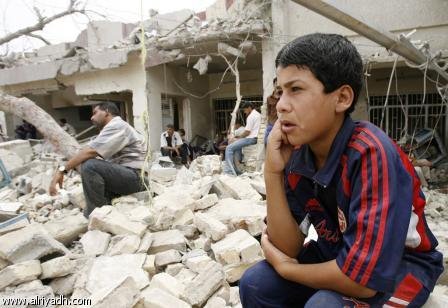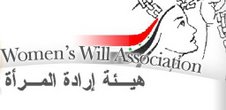Iraqi Youth Face Lasting Scars of War
Conflict's Psychological Impact on Children Is Immense, Experts Say
By Sudarsan RaghavanWashington Post Foreign ServiceTuesday, June 26, 2007;
BAGHDAD -- Marwa Hussein watched as gunmen stormed into her home and executed her parents. Afterward, her uncle brought her to the Alwiya Orphanage, a high-walled compound nestled in central Baghdad with a concrete yard for a playground. That was more than two years ago, and for 13-year-old Marwa, shy and thin with walnut-colored eyes and long brown hair, the memory of her parents' last moments is always with her.
"They were killed," she said, her voice trailing away as she sat on her narrow bed with pink sheets. Tears started to slide down her face. As social worker Maysoon Tahsin comforted her, other orphans in the room, where 12 girls sleep, watched solemnly.
Iraq's conflict is exacting an immense and largely unnoticed psychological toll on children and youth that will have long-term consequences, said social workers, psychiatrists, teachers and aid workers in interviews across Baghdad and in neighboring Jordan.
"With our limited resources, the societal impact is going to be very bad," said Haider Abdul Muhsin, one of the country's few child psychiatrists. "This generation will become a very violent generation, much worse than during Saddam Hussein's regime."
Since the U.S.-led invasion in 2003, 4 million Iraqis have fled their homes, half of them children, according to the United Nations Children's Fund. Many are being killed inside their sanctuaries -- at playgrounds, on soccer fields and in schools. Criminals are routinely kidnapping children for ransom as lawlessness goes unchecked. Violence has orphaned tens of thousands.
Marwa copes by taking care of her sisters Aliyah, 9, and Sura, 7, Tahsin said. Marwa helps them with their homework and bathes them. On the playground, she keeps careful watch.
"She's trying to substitute for the role of their mother," said Tahsin, who has been a social worker for 15 years. "But even as she tries to fill this gap, she is in deep need for emotional support as well."
Short and lean with a square jaw, Abdul Muhsin started to focus on children only last year. Like many of the estimated 60 psychiatrists who remain in Iraq, he treated only adults before the invasion. Back then, he said, children with psychological problems were a rarity.
Inside his bare office at Ibn Rushed Psychiatric Hospital, where armed guards frisk patients at the entrance, he flipped through a thick ledger of patients. In the past six months, he has treated 280 children and teenagers for psychological problems, most ranging in age from 6 to 16. In his private clinic, he has seen more than 650 patients in the past year.
In a World Health Organization survey of 600 children ages 3 to 10 in Baghdad last year, 47 percent said they had been exposed to a major traumatic event over the past two years. Of this group, 14 percent showed symptoms of post-traumatic stress disorder. In a second study of 1,090 adolescents in the northern city of Mosul, 30 percent showed symptoms of the disorder.
Today, toy weapons are among the best-selling items in local markets, and kids play among armored vehicles on streets where pickup trucks filled with masked gunmen are a common sight. On a recent day, a group of children was playing near a camouflage-colored Iraqi Humvee parked in Baghdad's upscale Karrada neighborhood. One boy clutched a thick stick and placed it on his right shoulder, as if he were handling a rocket-propelled grenade launcher. He aimed it at cars passing by, pretending to blow them up. Two soldiers pointed at the children and laughed.
Many of the children Abdul Muhsin treats have witnessed killings. They have anxiety problems and suffer from depression. Some have recurring nightmares and wet their beds. Others have problems learning in school. Iraqi children, he said, show symptoms not unlike children in other war zones such as Lebanon, Sudan and the Palestinian territories.
On this morning, 4-year-old Muhammad Amar had a blank look on his soft, round face framed with curls of black hair. When mortar shells pummeled his street seven months ago, he was too terrified to cry. "He remained still, in shock. He froze," said his father, Amar Jabur, standing in the sunlit courtyard of Ibn Rushed. Muhammad is showing signs of epilepsy and had a mild seizure the night before.
Abdul Muhsin said he believes there could be a link between the explosions and the seizure, and recommended a brain scan to rule out other causes. At the very least, he said, the violence worsened the child's condition.
After the visit, Jabur cast a glance at his silent son. "It is quite possibly because of the fear," he said. "We adults are afraid of what's happening in Iraq. How do you think it will affect the children?"
Three months ago, Abdul Muhsin treated his most horrific case. A 13-year-old girl had been kidnapped in Baghdad's Mansour neighborhood and held for a week in a house with 15 other girls. Some were raped in front of her, another was fatally shot. The girl was released after her parents paid a $6,000 ransom. But she is still imprisoned by her experience.
"She was in a terrifying condition," recalled Abdul Muhsin. "She was shouting. She abused her parents verbally and physically."
He and other child specialists say as many as 80 percent of traumatized children are never treated because of the stigma attached to such ailments.
"Our society refuses to go to psychiatrists," said Abdul Sattar Sahib, a pediatrician at Sadr General Hospital in Sadr City.
Many children live in remote or dangerous areas, sliced off from Baghdad by insurgents, bombings, and checkpoints. "Some parents just call me by telephone, and I try to advise them," Abdul Muhsin said.
At Sadr General, as many as 250 children arrive for treatment every day, nearly double from last year. "We only treat the first 20 children who arrive and then we run out of drugs," Sahib said. There is no child psychiatrist on staff.
Parents Lost
At the orphanage, Dina Shadi sleeps a few feet away from Marwa Hussein. Twelve-year-old Dina had recently received two telephone calls from relatives. She learned that her 17-year-old brother had been killed and that her aunt had been kidnapped and executed.
"She totally collapsed," Tahsin recalled.
"I was not able to control myself that day. I cried," Tahsin said, her voice cracking. "There is a great amount of sadness here. No matter what we do for the children, it will never replace the kindness of their mother and father."
"Now Dina expects another call with more bad news. She has a very dark image of the future. More and more, she's afraid of the future."
UNICEF officials estimate that tens of thousands children lost one or both parents to the conflict in the past year. If trends continue, they expect the numbers to rise this year, said Claire Hajaj, a UNICEF spokesperson in Amman, Jordan.
While many children at the orphanage have lost one or both parents, others have been abandoned or sent here because their parents can no longer afford to care for them.
"The tragedy is that there's an upswing in number of children who are losing parents, but you see a decrease in the ability of the government, the community and even the family to care for separated and orphaned children because of violence, insecurity, displacement, stress and economic hardship," Hajaj said. "These kids are definitely the most vulnerable around."
Bombs have exploded near Alwiya, and the sound of gunfire is frequent. There is always the possibility of an attack. In January, mortar shells landed in a Baghdad school, killing five girls.
Tahsin still had one more task this day. She had to inform two motherless sisters that their father, a Sunni truck driver, would not be coming to see them. He had been kidnapped by Shiite gunmen at a fake checkpoint and executed.
Learning Sectarian Hate
At a primary school in the Zayuna neighborhood of Baghdad, three teachers sat in the head office lamenting how Iraq's sectarian strife had affected their classrooms. A quarter of their students had left for safer areas. Some parents were too scared to send their children to school, fearing attacks.
"Now, the young students when they enter the school, they ask their classmates whether they are Sunni or Shia," said Nagher Ziad Salih, 37, the school's principal.
"Yesterday, I was taking my 6-year-old grandson for a walk. He asked me 'Is this a Shia street or a Sunni street?' " said Um Amil, who asked that her full name not be used because she was afraid she could become a target. "I said: We are all Muslims. But he was still determined to know if this was street was Sunni or Shia."
"Such a child, when he grows up, what will he become?" she asked.
Salih said children quarreling on the playground now invoke the names of armed groups. "The child would say: I'll get the Mahdi Army to take revenge," she said. "The other kid would say back: My uncle is from the [Sunni] resistance and he'll take revenge against you."
The third teacher, Um Hanim, spoke up.
"Now the kid whose parent is killed by a Sunni or a Shia, what will be his future?" she said, also insisting that her full name not be used. "He will have a grudge inside him."
Child psychiatrists are noticing the sectarian divide affecting their young patients. Mohammed Quraeshi, a doctor at Ibn Rushed, recalled the day he treated two boys -- one 6, the other 9 -- who were suffering from anxiety.
"They faced harassment from children at their school. They demanded to know if they were Sunni or Shia." Quraeshi said. "This is too terrible to think that this can happen at this age."
'Desire to Seek Revenge'
Twenty-year-old Yasser Laith, short with a thin goatee and a cold stare, cannot sleep at night. When a rocket crashed into his family's house in the mostly Sunni neighborhood of Adhamiya in November, he crawled into the kitchen and curled up in fear.
"Whenever I hear an explosion, I start trembling," mumbled Laith, as he waited at Ibn Rushed hospital for a 10-day supply of anti-psychotic drugs.
Another day, intense clashes erupted on his street, and U.S. combat helicopters hovered over the area. Laith grabbed an AK-47 assault rifle, rushed to his roof and began firing into the sky.
"My father is ashamed of me. I wanted to show that I was a good as the others," Laith said with a half-crazed smile. "After that I felt satisfied."
Today, he takes pills to help control his violence and stop him from hitting his two younger sisters or abusing his parents. Several of his friends, he said, had joined the Sunni insurgency. He, too, was tempted, especially after learning that one of his friends had been killed by the Mahdi Army.
"I had the desire to seek revenge," Laith said, smiling again.
When Laith left the room to go to the bathroom, his 57-year-old mother, Sahira Asadallah, said she was scared that her son would commit a crime or join an insurgent group. She wondered how long Laith would have to take the drugs, then answered herself: "This will only end with the end of the war."





